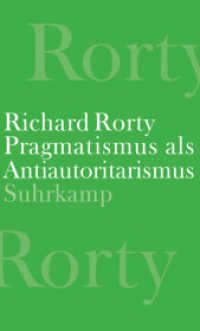- ホーム
- > 洋書
- > 英文書
- > Politics / International Relations
Full Description
Public decisions on environmental risk have traditionally been weighed in terms of the principle of efficiency and its methodologies, such as cost-benefit and risk-benefit analysis. These original essays argue for moving beyond the market paradigm toward making policy that incorporates environmental values. Scholars representing a broad range of disciplines present a thorough analysis and methodological investigation of environmental risk and the potential for integrating environmental values into the policymaking process. They address the normative and theoretical roots of environmental risk, describe the distinct domain that exists for environmental values as opposed to economic values, and look at the conflicts between economic and environmental values within the applied context of the NIMBY (not in my back yard) phenomenon.
Contents
Introduction -- Value Domains, Integrity, and Policy Argument -- Integrity, Intrinsic Value, and the Analysis of Environmental Risk -- Moral Domains, Economic Instrumentalism, and the Roots of Environmental Values -- Environmentalism: Values to Politics to Policy -- Value Conflicts, Domain Trade-offs, and Political Cooperation -- The Nature of Environmental Values -- Environmental Values and Democratic Institutions -- Science, Environmental Values, and Policy Prescriptions -- Environmental Values and the NIMBY Syndrome -- Partisan Politics, Economic Growth, and the Roots of NIMBY: The Case of Montpellier, France -- Environmental Values, the Economic Ethos, and NIMBY: The Rhode Island Case -- Intrinsic Value and Public Policy Choice: The Alberta Case -- Epilogue: Environmental Values and Economic Trade-offs— Conflict and Compromise








